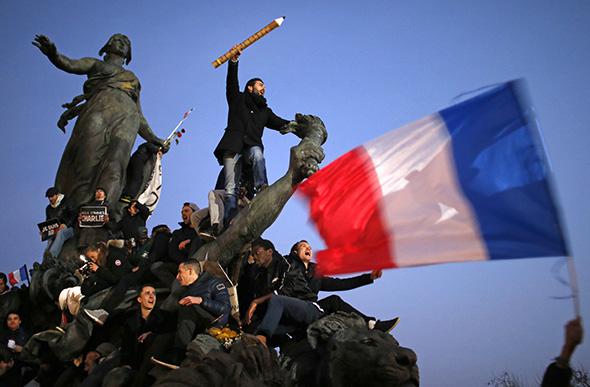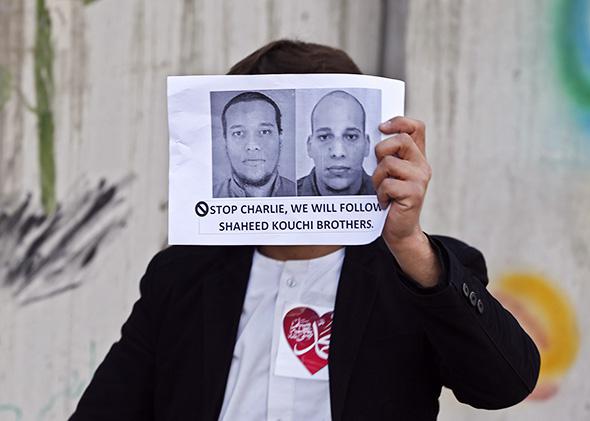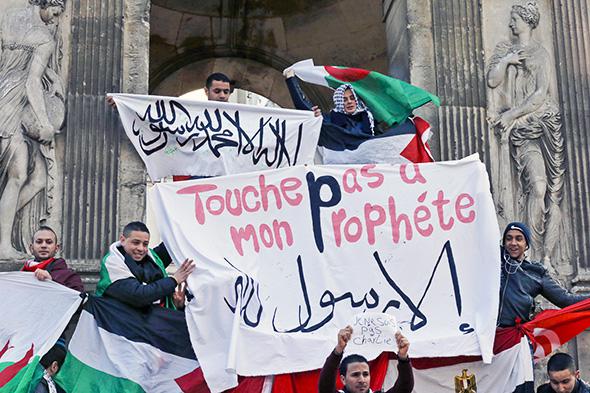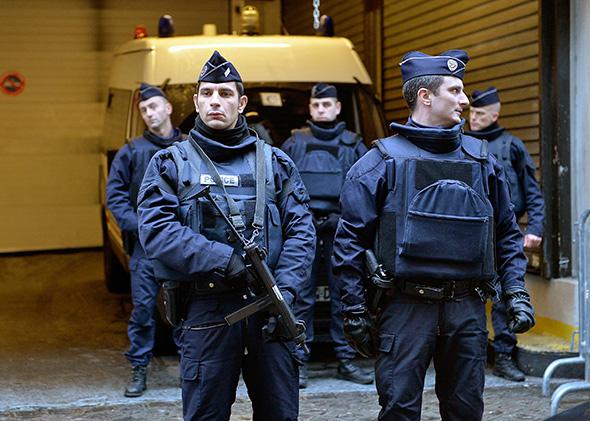What can we learn from the recent terrorist attacks in Paris? Here are eight lessons.
1. Terrorism has many audiences. The terrorist attack at the offices of Charlie Hebdo in Paris caused worldwide revulsion, provoked denunciations by Muslim leaders, and prompted millions to march for the right of free expression, which, according to French authorities, was the largest demonstration in French history. In other words, from the terrorists’ perspective, the bloody attack was a great success.
The attack attracted worldwide attention, caused fear and alarm, and allowed the killers to burnish their reputation as warriors. Dressed in black and armed with automatic weapons, they carried out their cold-blooded mission and escaped, at least for a short while. Observers described the terrorist operation as well planned, its execution competent—the attackers “seemed comfortable with their weapons,” said one former U.S. official. Of course, no one was shooting back, which makes things more comfortable. The attackers made a few mistakes—initially going to the wrong address, killing a policeman who turned out to be Muslim, and leaving behind an identity card in the getaway car—but the attack does stand in contrast to the recent spate of shootings, stabbings, and car-ramming attacks by jihadist loons.
Al-Qaida in the Arabian Peninsula claimed responsibility. Its strategists see communicating their message as 50 percent of the struggle. Almost all wartime propaganda is aimed at the homefront. The attack will hearten jihadists everywhere and gives al-Qaida a propaganda victory over its rival, ISIS, which had no choice but to also praise the attackers. Beyond the jihadist universe, revenge against those who would insult the prophet is applauded even among those who reject its violent delivery.
2. We participate in the creation of terror. Competitive news coverage, sober assessments alongside fear-mongering, and the perceived necessity for political leadership to respond combine to inflate the threat. The assault on Charlie Hebdo was the worst terrorist attack in France since the Algerian War more than 50 years ago. Anxiety demands visible action. France deployed 10,000 troops and 5,000 more cops. The United States issued a worldwide travel advisory, warning Americans to beware of the potential for new “terrorist actions and violence” everywhere. These steps are necessary, but they also elevate the terrorists and the threat they appear to pose.
Network news and 24-hour news channels mobilized countless talking heads to condemn the violence. Many seemed determined to frighten the audience—the doomsayers get the most attention. Good form requires expressions of sympathy for the victims followed by tough talk—bowed heads and clenched fists. Anything else risks accusations of ignoring the peril, weakness, aiding the enemy.
For government officials, it is an opportunity to share their concerns about the challenges they face and the resources they require. Others take the opportunity to advance political agendas, criticizing feckless governments for not doing more to stop the terrorists before they strike.

Photo by Stephane Mahe/Reuters
3. Al-Qaida remains a threat. While America’s attention has recently focused on defeating ISIS, the Paris attack underscores al-Qaida’s continuing commitment to terrorist attacks against the “far enemy.” The United States remains at the top of the list. Despite the American-led bombing campaign, ISIS has yet to launch terrorist attacks outside of the region, although that could come. Meanwhile, al-Qaida’s central command, and especially its Yemen-based affiliate, remain dedicated to attacks on the United States.
This threat is multidimensional. Relentless pursuit has made it extremely difficult for al-Qaida to launch terrorist attacks on the scale of 9/11, but this has hardly rendered the group powerless. Al-Qaida reportedly sent veteran fighters and planners from Afghanistan and Pakistan to Syria to seek Western recruits among jihadist volunteers for terrorist missions in the West. Both AQAP and ISIS urge their supporters abroad to carry out terrorist actions at home. Experienced fighters returning from Syria and Iraq add another layer to the threat as demonstrated by the shootouts and arrests in Belgium following the Paris attack.
4. Would-be warriors are unconcerned with the current schisms among jihadist camps. The Kouachi brothers operated on behalf of AQAP. Their comrade in arms who attacked the kosher deli, Amedy Coulibaly, pledged loyalty to ISIS. This is not evidence of a rapprochement and operational cooperation between the two groups. In Syria, they are still at war with each other. Some jihadists hope the schism will lead to a competition to carry out attacks in the West. It matters little to would-be attackers in the West whether support comes from al-Qaida or ISIS. Terrorists are dedicated to action, perhaps more so than loyalty.

Photo by Omar Sobhani/Reuters
5. Terrorists are persistent. The Kouachi brothers were devoted terrorists. Their jihadist activities go back 10 years, despite arrests and prison, and only ended with their death. That kind of determination, which is not uncommon, creates a dilemma for authorities. They cannot permanently assign minders to every would-be warrior or returning fighter. Can radicalization and recruitment to violence be prevented? Can it be reversed through deradicalization programs, which have a mixed record of success? Should mere intent suffice for conviction and jail? Or should prison sentences be lengthened to simply take dangerous people out of circulation? The United States has adopted a harsh course, convicting on intent and imposing lengthy prison terms. Europeans have put less emphasis on punishment and more on persuasion. With hundreds of jihadists returning from Syria and Iraq, these approaches will be tested.
6. It can happen here. In the United States, the invariable question is “Can it happen here?” The answer is yes. What police call “active shooters” pose a growing problem for law enforcement in America. Since 9/11, authorities have uncovered a number of jihadist terrorist plots to carry out armed assaults at various targets—military training and recruiting centers, Congress, shopping malls, synagogues. It has happened here. Inspired by militant mentor Anwar al-Awlaki, who also motivated the Kouachi brothers in Paris, Major Nidal Hasan shot and killed 13 of his fellow soldiers and wounded 31 others at Fort Hood in 2009.
7. Europe has a more serious problem. Like ISIS’s declaration of the Islamic State and its advances in Iraq and Syria, the attack in Paris will embolden local extremists to declare their own Islamic ministates and demand political and legal status. Homegrown plotters, reinforced by potentially hundreds of fighters returning from jihadist fronts in Syria and Iraq, will be inspired to carry out more attacks. At the same time, the Paris attack feeds anti-Muslim and anti-immigration sentiments, which are growing political forces in France, Germany, the United Kingdom, and elsewhere in Europe. There already have been isolated acts of retribution directed against Europe’s Muslim community. Further acts of violence by jihadists will provoke violence by nativists and ultra-nationalists. This goes beyond a police problem.

Photo by Pascal Rossignol/Reuters
8. Intelligence is crucial. Intelligence services have been under fire as a consequence of alleged and real excesses, but they remain the first line of defense. Whether or not the offices of Charlie Hebdo should have been better protected will be debated. French authorities must review why their intelligence services were not on top of the Kouachi brothers, both of whom had been arrested on multiple occasions for involvement in terrorist activities. One of them was further radicalized in prison, contacted AQAP while in Yemen, and then returned, acquired weapons illegally, and carried out the attack. French authorities clearly were on to him as someone of interest but apparently concluded that he posed no imminent threat.
Part of the problem is volume. Kouachi reportedly was under surveillance for a while. But the number of individuals in France and elsewhere in Europe who merit watching has increased significantly and rapidly, stretching resources. Keeping one person under continuous surveillance requires a significant investment in human resources. Trying to keep hundreds under surveillance overwhelms capacity.
Since 9/11, authorities have uncovered and thwarted 44 alleged homegrown jihadist terrorist plots in the United States, some with the help of information provided by members of the U.S. Muslim community. While defense attorneys disputed the existence of actual plots in many of the cases, and most were embryonic and amateurish, it is still a remarkable intelligence and investigative achievement, which probably has a deterrent effect. Still, the threat remains.
